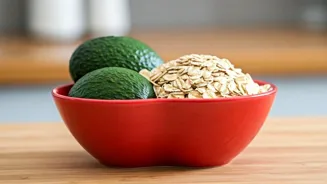The Cholesterol Challenge
High cholesterol presents a significant health concern, raising the risk of various cardiovascular issues. Elevated LDL cholesterol, often referred to
as "bad" cholesterol, can accumulate in the arteries, forming plaque and potentially leading to blockages. This build-up narrows the arteries, a condition known as atherosclerosis, which can restrict blood flow. Understanding these risks is the first step towards proactive heart health. The implications of high cholesterol are serious, making early detection and management crucial. Addressing elevated cholesterol levels is essential for preventing more severe complications like heart attacks and strokes. The long-term consequences underscore the importance of maintaining healthy cholesterol levels through dietary adjustments and lifestyle changes.
Oats: Nature's Remedy
Oats, a staple in many diets, naturally contribute to lowering cholesterol levels. This is largely due to their soluble fiber content, which helps reduce the absorption of cholesterol into the bloodstream. When consumed, this fiber binds with cholesterol in the digestive system and facilitates its elimination from the body. Regular consumption of oats has been shown to significantly lower LDL cholesterol levels, offering a practical and accessible dietary strategy for heart health. Preparing oats in various forms, such as oatmeal or adding them to smoothies, provides flexible and easy ways to incorporate them into your daily diet, enhancing their cholesterol-lowing benefits. Starting your day with a bowl of oats can be a simple yet effective step toward managing cholesterol and supporting overall heart health.
Sterols and Stanols Power
Plant sterols and stanols, found in certain foods, are another powerful tool in the fight against high cholesterol. These compounds are structurally similar to cholesterol but are absorbed by the body in a different manner. They compete with cholesterol for absorption in the digestive tract, which results in a reduced intake of cholesterol into the bloodstream. This mechanism naturally lowers LDL cholesterol levels and provides a support for heart health without relying on statins. They are often added to foods like fortified margarine, yogurt, and orange juice, making them accessible and easy to incorporate into your meals. Regular use of foods enriched with sterols and stanols can be a useful strategy for those looking to manage their cholesterol levels effectively, providing a natural and helpful approach.














